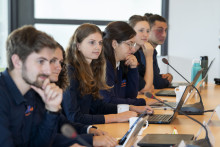To start, what is the university council?
The university council, in Dutch known as universiteitsraad or Uraad in short, is the central participation body of the UT. The council exists of nine students and nine employees. Every six weeks, they have public meetings with the executive board about a wide variety of policy topics. For instance, the university council has a say in topics like wellbeing, housing, internationalization, education, budget and strategies. Depending on the severity of the topic, amount of money involved or underlying procedures, the executive board either has to ask the council for consent or advice. Other cases are just meant to inform the council.
How does this council represent my interests?
What you’re probably going to notice, might you ever attend a meeting, is that discussions get very detailed and procedural very fast. The university council generally doesn’t have an agenda-pushing role. It has more of a controlling role, reviewing (policy) documents brought in by the executive board and scrutinizing how they affect the UT and its community. Since the devil is usually in the details, this is what the council pays close attention to. Even those details can come very close to the individual interests of students. Just think of the 0 or 15 EC rule within the Twente Educational Model; the council has been discussing that particular topic with the executive board for years.
And we can elect the people on this council?
That’s what’s indeed at stake this week: the university’s very own democracy. Every year, students can vote for nine student representatives in the university council. Employees can choose nine new employee representatives every two years. People are usually united in a party, that has its own ‘voice’ and views, depending on the interests, following and themes they represent.
So, what’s there to choose from?
Bad news for employees: you have nothing to choose from this year, because only eight candidates would have been running for the available nine seats. So the employee elections got cancelled.
For students, there is however more than enough to choose from. Four parties and 38 candidates in total, to be exact. Two parties have been represented in the council for years now: UReka and DAS (which stands for The Ambitious Student). There are also two newcomers, born in the midst of the crisis: uTOP and Genesis.
If you want a more in-depth look at the topics and themes the respective parties are passionate about, make sure to look at our Election Countdown miniseries.
How can I vote and why should I?
Voting goes digitally, through this link. And you’ve probably also received an email of the university with a link to the voting page. Just select the party/candidate of your choice. You have time to make up your mind until Friday at noon.
In the end, no one is forcing you to vote. But just look at it this way: all the electable students are willing to sacrifice their time to best represent your voice and discuss important topics with the university council. You only have to think for yourself who comes closest to your own views and values and who to vote for. The voting itself just takes about the same amount of time as opening your Instagram feed.
How does the current crisis affect things?
It already caused the postponing of the elections, from last month to this month, since there were too few candidates to choose from before. And the crisis also seemed to play an important part in the cancellation of the employee elections.
Voting (still) goes digitally, so nothing has changed in that regard. What will be interesting to see, is what the campaigns will look like: how will the parties persuade students to vote for them? Other years, it was all about handing out ice cream and stroopwafels on campus and having a quick chit-chat about university politics. Most campaigning activities will probably take place online because of the crisis. There are plenty of uncertainties in place: what will the turnout be? And will the new parties be able to secure one or more seats on the council? We’ll know on Friday evening.







